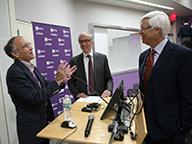Business and Policy Leader Events
—
4-School Conference 2015
—

The 4-School Conference brings together faculty, students, and researchers from Stern, Columbia, Yale and Wharton.
Business and Policy Leader Events
—

The 4-School Conference brings together faculty, students, and researchers from Stern, Columbia, Yale and Wharton.




















